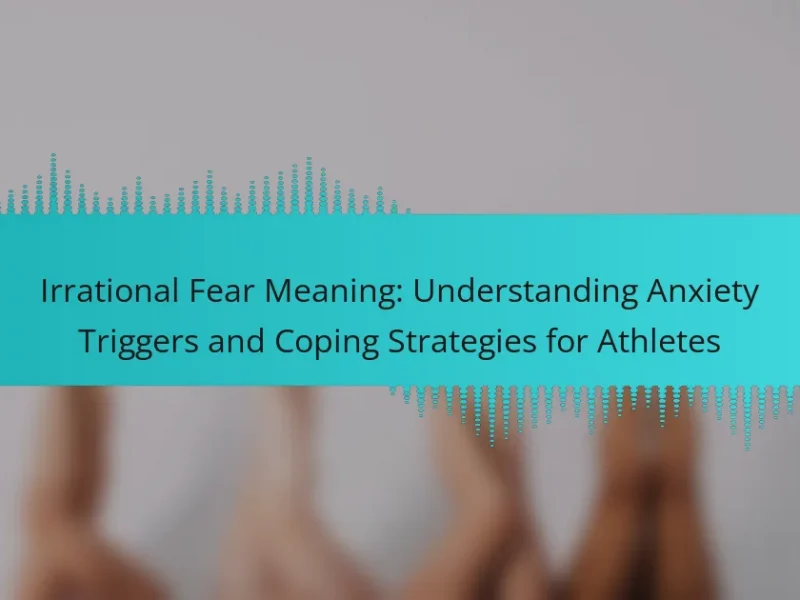Competitive athletes often face performance anxiety and stress, which can hinder their success. Building self-trust through self-affirmation, visualization, and mindfulness techniques is essential. A strong mental resilience program includes personalized coping strategies and regular mental skills training. These approaches foster focus and enhance performance under pressure.

How Can Athletes Build Trust in Themselves to Combat Performance Anxiety?
Athletes can build trust in themselves by practicing self-affirmation, visualization, and mindfulness techniques. These strategies help combat performance anxiety effectively. Self-affirmation reinforces confidence through positive self-talk. Visualization allows athletes to mentally rehearse successful performances, enhancing belief in their abilities. Mindfulness techniques, such as deep breathing and meditation, promote focus and reduce stress. By consistently applying these methods, athletes can develop a stronger sense of self-trust, leading to improved performance under pressure.
What Are the Common Sources of Performance Anxiety in Competitive Sports?
Common sources of performance anxiety in competitive sports include fear of failure, high expectations, and pressure from coaches or peers. These factors create a mental block that can hinder performance.
Fear of failure often stems from past experiences or the desire to meet personal or external standards. High expectations, whether self-imposed or from others, can lead to overwhelming stress. Pressure from coaches and teammates can intensify anxiety, making athletes doubt their abilities.
Understanding these sources helps athletes develop strategies to manage anxiety. Techniques such as visualization, mindfulness, and positive self-talk can mitigate these effects and enhance performance.
What Techniques Can Help Athletes Manage Stress Effectively?
Athletes can manage stress effectively by employing techniques such as visualization, breathing exercises, and positive self-talk. These methods enhance focus and build confidence, reducing performance anxiety. Visualization involves imagining successful performances, which can mentally prepare athletes for competition. Breathing exercises help regulate physiological responses to stress, promoting calmness. Positive self-talk reinforces belief in abilities, countering negative thoughts that can arise under pressure. Regular practice of these techniques can lead to improved mental resilience and overall performance.
How Does Visualization Improve Performance and Reduce Anxiety?
Visualization enhances performance and reduces anxiety by enabling athletes to mentally rehearse their actions. This technique builds confidence, improves focus, and fosters a positive mindset. Research shows that athletes who visualize their performance experience lower anxiety levels and demonstrate better execution of skills. Visualization serves as a unique attribute, allowing athletes to create mental scenarios that align with their goals, ultimately enhancing their competitive edge.
What Role Does Breathing Control Play in Stress Management?
Breathing control significantly reduces performance anxiety and stress in competitive athletes. It activates the parasympathetic nervous system, promoting relaxation and focus. Techniques like diaphragmatic breathing enhance oxygen flow, improving endurance and mental clarity. Regular practice fosters a unique resilience, enabling athletes to maintain composure under pressure.
What Are the Unique Challenges Female Athletes Face Regarding Anxiety?
Female athletes face unique challenges regarding anxiety, including societal pressures and performance expectations. These factors can exacerbate feelings of self-doubt and stress. Research indicates that female athletes often experience higher levels of anxiety compared to their male counterparts due to these external pressures. Additionally, the stigma surrounding mental health in sports can hinder their willingness to seek support. Addressing these challenges requires fostering an environment that promotes open discussions about mental health and encourages self-trust.
How Can Team Dynamics Influence Individual Performance Anxiety?
Team dynamics significantly influence individual performance anxiety by shaping the support and trust among athletes. Positive relationships within a team can reduce anxiety, while negative dynamics may heighten stress levels. For instance, a cohesive team fosters an environment where athletes feel secure and confident, leading to improved performance. Conversely, a lack of trust can amplify self-doubt and pressure, resulting in heightened anxiety. Ultimately, the quality of team interactions plays a crucial role in managing performance-related stress for individual athletes.
What Are the Rare Strategies for Overcoming Mental Blocks in Sports?
To overcome mental blocks in sports, athletes can employ rare strategies such as visualization techniques, mindfulness practices, and cognitive restructuring. Visualization involves mentally rehearsing successful performance, enhancing confidence and focus. Mindfulness practices help athletes stay present, reducing anxiety and stress. Cognitive restructuring shifts negative thought patterns, fostering a positive mindset. These methods can significantly improve performance by addressing the psychological barriers that hinder success.
How Can Athletes Use Journaling to Reflect on Their Performance?
Journaling helps athletes reflect on performance by identifying emotions and patterns. It fosters self-trust, reducing anxiety and stress. Regular entries allow athletes to track progress and set goals, enhancing mental resilience. This practice can lead to improved focus and a positive mindset during competitions.
What Impact Does Positive Self-Talk Have on Athletic Performance?
Positive self-talk significantly enhances athletic performance by reducing anxiety and boosting confidence. Athletes who engage in positive self-talk report improved focus and resilience during competition. Research indicates that self-affirmation techniques can lead to a measurable increase in performance metrics, such as speed and accuracy. This psychological strategy fosters a growth mindset, enabling athletes to overcome stress and maintain composure under pressure.

What Are the Core Features of a Strong Mental Resilience Program?
A strong mental resilience program for athletes includes self-trust, effective stress management, and performance enhancement techniques. Key features are personalized coping strategies, regular mental skills training, and the establishment of a supportive environment. These elements foster a mindset that can withstand competitive pressures and reduce performance anxiety. Regular assessments of mental health and progress tracking also enhance resilience. As a result, athletes can improve focus and maintain peak performance under stress.
What Common Mistakes Do Athletes Make When Dealing with Stress?
Athletes often make mistakes such as ignoring mental preparation, overtraining, and neglecting recovery. These errors can exacerbate performance anxiety and stress.
Ignoring mental preparation can lead to increased anxiety during competitions. Athletes may fail to develop coping strategies, which are crucial for managing stress. Overtraining can result in physical and mental fatigue, diminishing performance and heightening stress levels.
Neglecting recovery, including rest and nutrition, can impair an athlete’s ability to handle stress effectively. Athletes should prioritize mental and physical recovery to enhance resilience against performance anxiety.
What Expert Insights Can Help Athletes Overcome Performance Anxiety?
To overcome performance anxiety, athletes can trust their preparation and develop mental resilience. Techniques such as visualization, mindfulness, and positive self-talk can significantly reduce anxiety levels. Research shows that athletes who practice mindfulness report lower stress and improved performance. Incorporating regular mental training sessions into practice can enhance focus and confidence, leading to better outcomes in competitive settings.
How Can Athletes Create an Actionable Plan to Improve Their Mental Game?
Athletes can create an actionable plan to improve their mental game by implementing specific strategies. Begin by identifying triggers of performance anxiety, such as high-stakes competitions or self-doubt. Next, develop coping techniques like visualization, mindfulness, and positive self-talk to build confidence. Regularly practice these techniques to reinforce a resilient mindset. Finally, set measurable goals to track progress and adjust strategies as needed, ensuring a proactive approach to mental health in sports.


